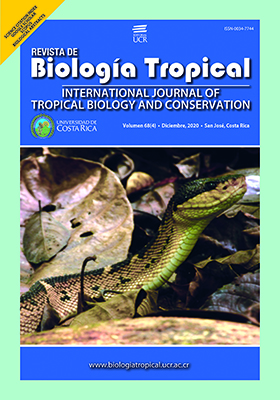Abstract
Introduction: Rice-field rats are one of the most important pests because it can give large losses in all planting seasons including the storehouse. Synthetic rodenticide is the most commonly used of chemical technique for controlling rice-field rats. The application of these materials indirectly causes negative impacts; one of them is for the environment. As an alternative for controlling rice-field rats, natural materials can be used as a repellent. Objective: to examine the effects of methanol extract of Plumeria rubra leaves on metabolism, daily activity patterns, and its potency as a repellent of the rice-field rat. Methods: The experiments were conducted at the Laboratory of Pests, Universitas Padjadjaran involves choice test (T-maze arena), and the Laboratory of Rats, Indonesian Institute for Rice Research involves no-choice test (metabolic cage) from February until May 2019. The observations including food (g), water consumption (ml), feces production (g), urine production (ml), body weight (g), and its changes (%), also the daily activities (time spent for locomotion, foraging, and resting).The treatment was done with three replications for twelve mature male and twelve mature non-pregnant females. Data experiments analysis followed by a T-test. Results: Rice-field rats on the T-Maze arena avoided consuming food and beverage that close to methanol extract of Plumeria rubra leaves treatment. The treatment of methanol extract of Plumeria leaves in metabolic cage caused metabolic disorder of rice-field rat, which was significantly indicated by the decrease of the average consumption of food by 2.28 g and excretion of feces by 0.34 g, and also the increase of average consumption of beverage by 3.89 ml, excretion of urine by 3.15 ml, and body weight by 6.67 g. The treatment also caused daily activity patterns disorder of rice-field rats, which was significantly indicated by the increase of the average percentage of time for movement activities (locomotion) by 7.64 % and the decrease of time for eating and drinking activities (foraging) by 16.46 %. Conclusion: Methanol extract of Plumeria leaves affects a repellent for the rice-field rat.
##plugins.facebook.comentarios##

This work is licensed under a Creative Commons Attribution 4.0 International License.
Copyright (c) 2020 Ichsan Nurul Bari, Nur Aini Herawati, Bunga Medina Suherman, Syifa Nabilah Subakti Putri



